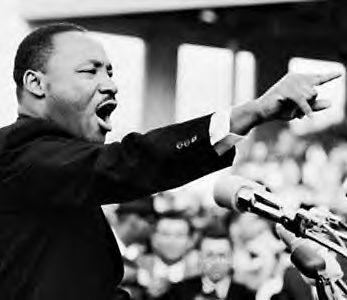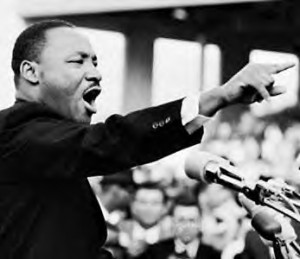An Extreme Social Vision: On King’s “Letter from a Birmingham Jail” – by J. Kameron Carter
The year 1963 was auspicious for Martin Luther King Jr, for it was the year in which he produced two profound documents. One has been (selectively) remembered, valorized, and celebrated; the other, lost to memory and subjected to American amnesia.
The former is the famous “I Have a Dream Speech.” It came at the high point of ’63, August of 1963 to be exact. Here are some of its most memorable and oft-quoted words:
I have a dream my four children will one day live in a nation where they will not be judged by the color of their skin but by the content of their character.
And
When the architects of our republic wrote the magnificent worlds of the Constitution and the Declaration of Independence, they were signing a promissory note to which every American was to fall heir.
And
And when we allow freedom to ring, when we let it ring from every village and hamlet, from every state and city, we will be able to speed up that day when all of God’s children . . . will be able to join hands and to sing in the words of the old Negro spiritual, “Free at last, free at last; thank God Almighty, we are free at last.”
But at one of the year’s low points, King authored another potent text. On April 16, 1963, as a jailed criminal, a prisoner in irons, as it were, King wrote an open letter known now in shorthand simply as his “Letter from a Birmingham Jail.”
The Letter From a Birmingham Jail
Why was King jailed? He was jailed for organizing and participating in civil rights demonstrations in Birmingham, AL. And why did he write his open letter? His incarceral letter was a response to eight prominent clergymen, all white, who published their own open letter earlier that year (in January). They invoked Christian civility, calling on King to cease and desist, to allow the battle for integration to continue in the jurisprudential forum of the local and federal courts. They warned King not to bring his nonviolent resistance movement to Birmingham, for if he did he would only incite unrest.
At the heart of King’s response to those eight ministers was a profound explanation of what lay at the heart of the American social crisis: a bankrupt American Christianity. According to King, at the heart of the American social crisis was a Christianity that has come to operate in tandem with social order. This is what King discerned in the words of these ministers. American Christianity had come to baptize, indeed, sanctify the social order of things, the order of white-over-nonwhite social relations. King came to see the crisis of American life as a crisis of the Christian life. the Christian life was in crisis because being a true American, an authentic citizen, and being (a white) Christian were taken to be the same thing.
Thus, what King heard in what these Christian ministers were saying was how their Christianity was functioning inside of the disciplines (and punishments) of American society. He saw that the more American Christians performed their Christianity, the deeper they performed their whiteness.
The Letter from Birmingham Jail ferrets out the connection between Christian social performance in America, on the one hand, and American racism and racial performance, on the other.
Christian Extremism
At the heart of his response to this dilemma is what he calls the “extremism” of Jesus Christ, an extremism that will be the nation’s salvation. It is what will produce what he calls in other writings a “beloved community”.
What does this extremism, this religious and “sacrificial” extremism, of a new social order entail? We get a clue from the Letter where King mentions that the American church and American Christians have not lived into what it means to be tied to Jesus Christ. He says at one point in the letter, “I see the church as the body of Christ. But, oh! How we have blemished and scarred that body through social neglect and through fear of being nonconformists.” For this reason God’s judgment, he says, is on the American church. What does this nonconformity consist in?
With the language of “nonconformity,” King was echoing the language of Paul: “be not conformed to this world, to the order of things, but be transformed by a renewed mind” (Rom. 12:2). The nonconformist life, as the life of the Church, is the repentant life, the life turned in a different direction. It is the life in which the circle of one’s concern—those whom one considers to be “my people”—is radically altered and expanded.
In the letter King captures this nonconformist circle of expanded concern, the social order tied to the reign of God, by linking Christian existence to the Jews. He uses the familial terms of brothers (and sisters) in describing Jews. He speaks of his Christian and Jewish brothers. As Christians and Jews belong together, so too do black folks belong to America as full citizens. The moral law, which as a Christian he links to the “law” of grace in Christianity, admits what the laws of an American society structured in domination refuse. If the Christianity tied to and that sanctifies the social order is invested in keeping America “pure” and in keeping the lines of who’s in and who’s out of the precincts of full American citizenship (and thus the community of humanity) clear at all times, then a nonconformist Christian existence is not invested in this. It is not invested in a politics of (white) social purity. Nor does it function in support of the material practices of everyday life that enact and sustain the politics of purity, a politics of who’s socially in and who isn’t.
Towards An “Extreme” Christian Social Vision
It is this kind of Christianity that King sought to bear witness to in his incarceral letter. It is what he calls in the letter an “extreme” Christianity. It is extreme because it heralds the cultural and political intimacy of all peoples, and it heralds a politics of belonging that follows from such intimacy.
But even more, it is an extreme Christianity it is rooted, King says in the Letter, in the extremism of Jesus Christ.
Now, it is often remarked that King wasn’t a theologian. He was an activist. True dat. But the claims of his letter for an extreme Christianity, a Christianity that goes that doesn’t merely provide religious cover for the order of things, a Christianity predicated on an extremism of Jesus Christ, rest on a fair bit of theology. Indeed, they rest on a socially innovative Christology or vision of the identity of Jesus Christ. I contend that King calls Jesus Christ extreme because he imagines a Jesus Christ whose identity, which the Christian is called to participate in (this is Christian discipleship), is an extreme identity.
In theological terms, what makes Jesus’ identity extreme is that he is the unity without confusion and without antagonism of the most extreme differences, the difference between Creator and creation. In him, Creator and creature unite in a profound harmony or communion. This is the incarnation. Moreover, Jesus’ death on the Cross was the response of a political and social establishment that refused such intimacy-in-difference; in short, that refused love. The socio-political order of Jesus’ day called for political and social conformity, even as it declared itself to be the center of reality. The Cross is the result of Jesus’ nonconformity, his refusal to conform to the false lords of the world and to their false supremacy. He was the truly repentant one, the one who was not conformed to order of things. His entire existence as a child of God (“Son of God”) was an articulation of these words: “I prefer not to; I don’t have to.” His life was turned in love to the true God, and thus to a proper love for those around him.
Such is the politics of Jesus. Such is his extreme identity in a world structured in false lordship. The resurrection testifies that Jesus was right. It witnesses to his righteousness in refusing the false lords of this world and having the strength to love rightly: to love the true God and embrace all of creation. But even more, the resurrection points to the coming future, to a politics inaugurated in him and that at the same time is yet to come. As such, Jesus’ resurrection empowers us in the present to struggle towards that future, towards his future. Again, this is the extremism of Jesus Christ.
Conclusion
The Letter from a Birmingham Jail, it turns out, is a profound tract of theology, indeed, of political theology. It is the kind of theology that has propelled Afro-Christianity to move ever towards the North Star of freedom within the modern/racial conjuncture. For this reason, King offers a salient word for 21st century America and for an American Christianity that in many ways, still decades after King’s death, yet wanders in the social wilderness.
It is high time to restore this letter to its rightful place in the American social memory.


